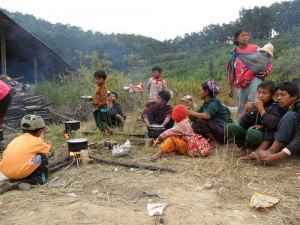Refugee Return Only with Consent, Safety and Dignity
By Burma Partnership • September 17, 2012 Anxiety and uncertainty has been building among refugees in Thailand’s camps regarding possible repatriation to Burma. While there are many actors who feel they have a major role in the decision-making of when and how this process will take place, none are more important than the refugees themselves. Thus, the release of a position paper by a group of Karen Community Based Organizations (KCBOs), many of whom work directly with communities inside Thailand’s refugee camps, is an important first step in making sure that it is those affected who determine the path that their lives will take.
Anxiety and uncertainty has been building among refugees in Thailand’s camps regarding possible repatriation to Burma. While there are many actors who feel they have a major role in the decision-making of when and how this process will take place, none are more important than the refugees themselves. Thus, the release of a position paper by a group of Karen Community Based Organizations (KCBOs), many of whom work directly with communities inside Thailand’s refugee camps, is an important first step in making sure that it is those affected who determine the path that their lives will take.
The position paper outlines pre-conditions for refugees’ return to Burma and the processes that must be followed once those preconditions have been met. The position paper is timely in that it was released the same week that the Thai National Security Council released a statement indicating that refugees will return within a year. Burma, the statement reads, “is clearing landmines along the borders, preparing to build shelters and other infrastructure… to be ready within one year.”
This was after a meeting in Naypyidaw between the Thai National Security Council and close advisor to President Thein Sein, Aung Min, himself a keen advocate of repatriation at the earliest possible point. Yet Saw Robert Htwe, Chairman of the Karen Refugees Committee, feels that this is impossible, given that large-scale demining programs will take at least one to two years.
Donors have also begun preparing for the return of refugees to Burma. The Thailand-Burma Border Consortium (TBBC), a long time provider of services to refugees in the camps, met with the Burma government to discuss opening an office and preparing for repatriation in the future.
It is telling that refugees and organizations that represent refugees have been absent from meetings between donors, the Thai and the Burma governments. This is why the KCBOs’ position paper is so important. Until now, refugees’ voices and CBOs who represent refugees have not been heard. So while these high-level meetings take place, the pre-conditions outlined in the paper have not been met. There is no political settlement or nationwide ceasefire, no withdrawal of Burma Army troops from ethnic areas (which was a fundamental reason for having to flee from their homeland), oppressive laws still exist and human rights violations are on-going. These are just a few pre-conditions outlined by the KCBOs. It is not only Karen people in the refugee camps either. There are substantial Muslim populations as well as Mon, Shan, Karenni, Chin, Kachin, Burman and other ethnic groups who may have different concerns regarding repatriation. These voices must be listened to as they belong to the people whose lives will be most affected in this process.
It is vital to bear in mind that many refugees want to go home eventually, but their return must be to a secure, sustainable life with their voluntary consent only. A Human Rights Watch report, also released last week, highlighted the dangers and ill-treatment refugees from Burma face at the hands of Thai authorities. In particular, refugees in Thailand have to make the tough choice between “stagnating for years in remote refugee camps or living and working outside the camps without protection from arrest and deportation.”
Despite the difficult situation that refugees face in Thailand, the process of their return must be carried out in strict accordance with international refugee and human rights law. As such both Thailand and Burma’s governments, UN agencies and donors must ensure that they involve refugees and CBOs from respective refugee communities at every stage of consultation, preparation, planning and implementation of return. Transparency is key to this process. Refugees must have as much information as possible available to them on the conditions in their place of return as early as possible. Keeping the information away from them for any reason will be unfair to them and will create more anxiety and confusion among the refugees. This won’t lead to a process that is in accordance with international refugee and human rights law. Moreover, a rushed, politically motivated process is not the answer to the problems faced by 150,000 refugees on the Thai-Burma border.
Tags: Burma Partnership, Refugee Repatriation, Refugees, ThailandThis post is in: Blog
Related PostsBurma Partnership Celebrates Continuing Regional Solidarity for Burma and Embraces the Work Ahead for Progressive Voice
Burma Army Displays Blatant Disregard for 21st Century Panglong Peace Process
Ann Din Coal Power Plant: Local Movement and Action to Preserve and Protect Natural Resources and Land: Mon IDP Report Case Study #4
Latest Human Rights Abuse Case Demonstrates Urgent Need to Reform the Myanmar National Human Rights Commission
Human Rights Far From Guaranteed as US Sanctions on Burma Are Removed









 All posts
All posts